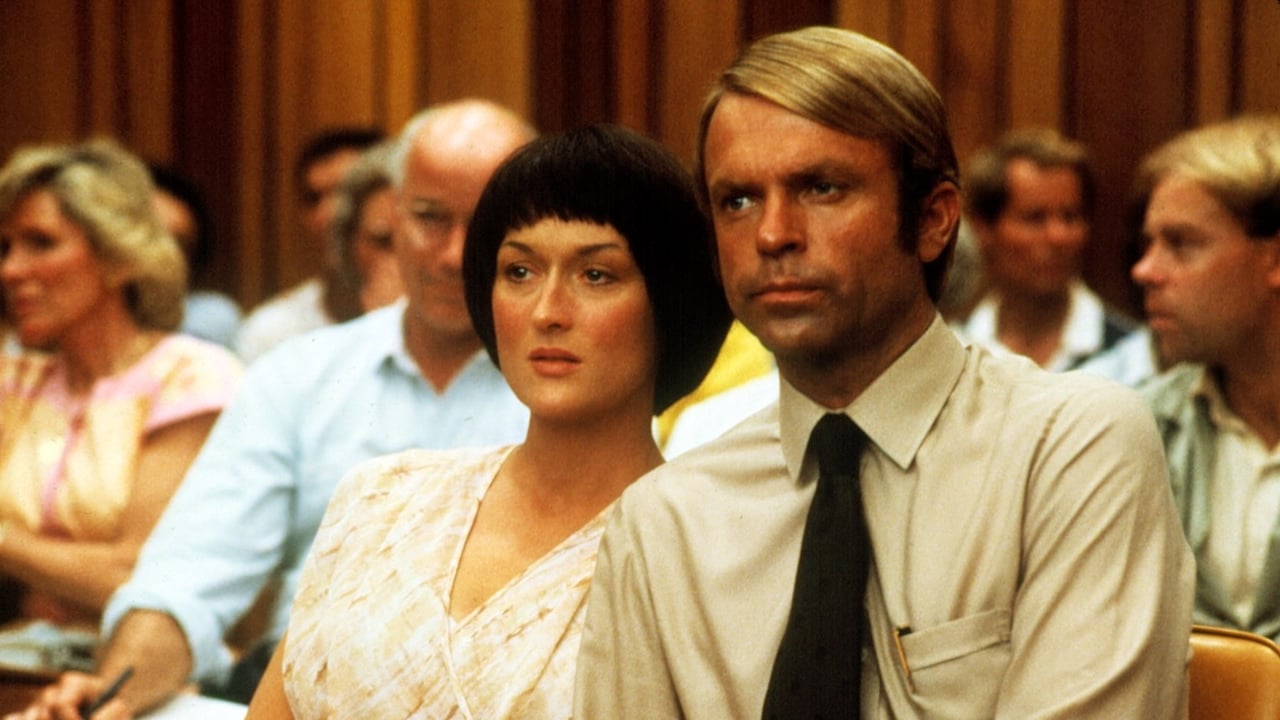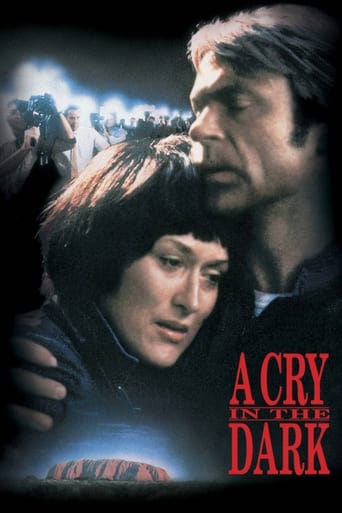



Worth seeing just to witness how winsome it is.
This film is so real. It treats its characters with so much care and sensitivity.
View MoreThis movie feels like it was made purely to piss off people who want good shows
View MoreThis is a dark and sometimes deeply uncomfortable drama
View MoreA contemporary, and classic, tale of injustice.Evil Angels, aka A Cry in the Dark, depicts the famous case of Azaria Chamberlain, a baby killed by a dingo near Ayers Rock / Uluru in 1980. Due to the sensationalist, libelous and slanderous nature of the Australian media and the evidence-manufacturing abilities of the Northern Territory Police the mother of the baby, Lindy Chamberlain, was charged with the baby's murder. What follows is a frustrating and harrowing ordeal, for the accused and for the viewer, as you are lead through the travesty that was the court case.Many themes are covered, none of which show Australian society in a positive light. Shows just how despicable the Australian media are - sadly, they're even worse now (95% of what you see or read in Australian media is sensationalized bs). Shows the incompetence, even corruption, of Australia's police forces, particularly in the Northern Territory in the 1980s. Shows how the media can influence a trial, and how far-from-optimal the jury system is. How the jury reached a unanimous guilty verdict is beyond me.Also shows how the media get the average yobbo caught up in someone else's affairs - the trial had nothing to do with them.Great performance by Meryl Streep in the lead role. She totally nails the accent (which is more than one can say for most Hollywood actors faking an Australian accent) and seems immersed in the role. She well deserved her Oscar nomination.Sam Neill is OK as Michael Chamberlain. The bit-part Australian actors often leave a lot to be desired, however, overdoing the redneckness.
View MoreSam Neil and Meryl Streep play Michael and Lindy Chamberlain, a married couple who take a camping trip in outback Australia with their baby daughter Azaria, who one night goes missing, and only her bloody and torn clothing is recovered. Lindy is convinced that a native Dingo(a sort of wild dog) grabbed and killed Azaria, but the police and public don't believe her, since they never heard of such behavior by a dingo, and so the Chamberlains find themselves arrested and charged with their daughter's murder. They would be tried and later convicted, though that would be later overturned, and they would eventually be exonerated.Fine performances by the leads, and good direction by Fred Shepisi make this a memorable and interesting tragic tale of a rush to judgment by both the press and public, a situation still relevant today.
View MoreAzaria Chamberlain, a nine week old Australian baby, disappears whilst on a camping trip with her family. Her parents report that the child was taken from her tent by a wild dingo. No body is found. The parents are arrested, suspected of murder.A highly publicised court-case follows. Azaria's mother, Lindy Chamberlain, is tried for murder. The media and public, finding the woman surprisingly cold, somehow get it into their collective heads that the parents are guilty because of this. As the media's focus on the trial is highly sensational, what follow is a public lynching of sorts, Lindy convicted of murder and sentenced to life imprisonment. Azaria's father, Michael Chamberlain, is then convicted as an accessory and given a suspended sentence.I will not spoil the film's conclusion, suffice to say that actress Meryl Streep, who plays Lindy Chamberlain, lends the film surprising power. Streep plays a very cold character, deliberately off putting. We're thus suckered, like the public, into believing we too can successfully "spot a liar".7.9/10 – Gentle direction, nice music and an impressive performance by Meryl Streep and Sam Neill as the film's central couple, make this an effective docudrama. The film's themes - "one woman against the world", "steadfast faith", "religious trials", "the importance of innocence" and "the danger of rash judgements" – are standard "movie of the week" stuff, far less interesting than Streep's performance. Worth one viewing.
View MoreI found it hard to like anyone in this film. The central characters, Lindy and Michael Chamberlain, whose daughter disappears during a night out in the Australian outback, are not bad people, but then surely not all, or even most, of the scores of people we see throughout this movie would be bad if we knew them better. But though we are as sure as the film wants us to be of the guilt or innocence of the Chamberlains from the start of their life's tragic disarray, the film takes on a more or less sociological perspective pertaining to gossip, news media, crowds, mobs and assumptions. It's not a movie about the society of Australia in particular; it's merely an account of a true story that happened there. Society en masse is much less evolved than the individual feels ensured that we are.When a warden insists upon killing all of an aborigine's dogs because of the unverified action of a single wild dog, when a randomly ruined life spins even further out of control owing to the majority of magazines, newspapers and TV programs distorts the tragic truth to a level of drama that provokes its consumers into a frenzy, there is no sign of empathy or even any kind of looking outside of one's own unaware perceptions, influenced left and right by the vigorous hearsay and vibes of those who surround one's life. The reason I appreciate the film is because it turns the focus inside out, from the victims to the masses.The evidence against Lindy Chamberlain aside, suspicion was jet-fueled mostly by a virtue of hers. To the public eye, she did not seem sufficiently distraught by the death of her baby daughter. Why was she able to keep her cool, even a sort of aloofness let alone holding her head up, for TV and the press? How much of the downward spiral could've been prevented had she behaved more to the public's liking in the media? Meryl Streep, one of, if not the, greatest actress working today, may not give a performance that particularly stands out, and frankly neither does any other actor, or department of film-making. But she, and the screenwriters, do understand Lindy. What is infuriating is that it's not that difficult. Apparently, she was not naturally prone to showing emotion in public in any case. Whether or not she is approachable as a lovable character in the immediate sense, we are naturally prone to sympathize with her situation.Whether or not her performance is as immediately gratifying as Sophie's Choice, The Devil Wears Prada, Angels In America or other such work, it is a triumph. It is difficult enrapture an audience when you purposely deny them insights into yourself. She frustrates us because we don't know what she's thinking or feeling. It took me awhile to feel endeared toward her, but this is the movie's way of suggesting the reaction of the public's attention.She is married to a pastor, and they both practice a religion that is in a small minority and thus misinterpreted by most. Initially, they react to their loss as if to be reconciling themselves to God's will, kick-starting a rumor mill generating the notion that their daughter's death was some sort of ritual killing on their part. Whatever happened to the little girl, her parents were part of a margin with whom most of the media's intake didn't immediately identify, so the first inclination was to go after them like a pack of hungry...well...Meryl Streep and Sam Neill are constantly on screen, but the public plays the real leads here. Like punctuation for each plot advance, director Fred Schepisi cuts away from restaurant to tennis court to dinner party to saloon to office, where the public tries Lindy and gets carried away into their own passionate projections.
View More